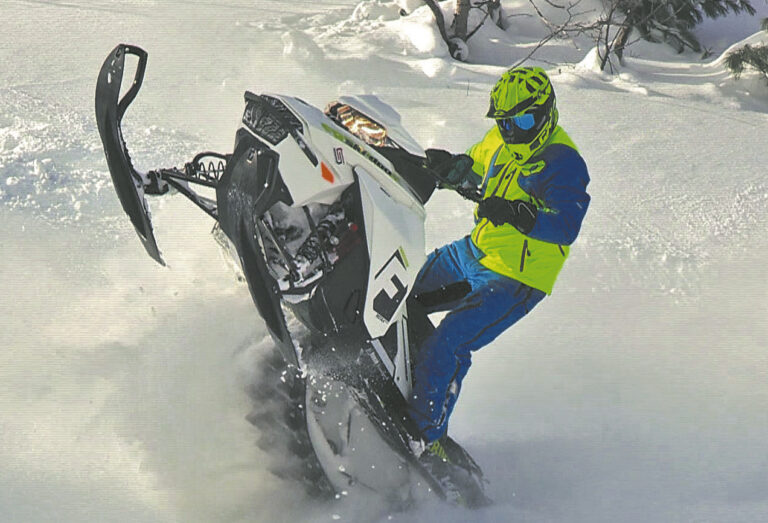Benefits to local businesses seen as uneven
Editor’s note:
This is the first story in a two-part series examining the effects of the past winter on the local business community.
After a disappointing snow year in 2023-24, winter roared back to Alger County in 202425, delivering deep snow, packed trails, full lodges and strong attendance at major events.
But even with those conditions, the economic impact on local businesses was a mixed bag.
“Over the years from the 2023-24 winter to 2024-25, we are looking at a 92% increase in our assessments,” said Cori-Ann Cearley, executive director of the Munising Visitors Bureau. Since those assessments are tied directly to lodging taxes, she added, “that essentially correlates to a 92% increase in visitation.”
After seeing just 79.3 inches of snow in the 2023-24 season, Munising logged 207.6 inches in 2024-25, according to Michigan Ice Fest’s post-season report. The stronger conditions helped attract visitors across multiple winter sports, from snowmobiling to cross-country skiing to ice climbing.
Tom Dolaskie, managing director of Deployed Capital, said restaurants in his group — including Tracey’s, the Brownstone Inn, Eh! Burger, Earl E. Byrds and Gallery Coffee Co. — saw winter revenue fall 20% compared to last season.
“There were no notable tourism spikes this winter, even with the better snow,” Dolaskie said. “In fact, we witnessed what a Munising that is ‘summer only’ would feel like should these economic trends continue.”
Dolaskie pointed to inflation, interest rates and declining middle- class discretionary income as major reasons for the drop.
Winter has long played second fiddle to summer tourism in Munising, but the gap has grown. A decade ago, Dolaskie said, winter typically brought in 20% of the year’s business. Now, he estimates it’s in the low single digits.
Shaun St. Amour, co-owner of Foggy’s Steakhouse in Christmas, said winter traffic was noticeably stronger than the previous season, estimating a 40% increase in business.
“We had decent business,” he said. “It was pretty night and day compared to the year before.”
About 65% of Foggy’s winter customer base came from snowmobilers, with another 15% made up of skiers, ice climbers and other winter sports visitors.
“We’re seeing more and more of the ice climbers, the skiers — that sort of thing,” St. Amour said. While he spends most of his time in the kitchen, he noted that front-of-house staff and financial data confirmed a solid bump in seasonal traffic.
Ben Cooper, owner of Buckhorn Resort, said this past winter brought a major boost in business — a 327% increase in sales compared to the previous year.
He credited nearly all of that to snowmobilers, who make up about 90% of Buckhorn’s winter customer base. While other winter activities like skiing and ice climbing brought in some traffic, Cooper said they account for just a sliver of the overall business.
“It’s all snow dependent,” he said, adding that trends in winter tourism continue to hinge on consistent snowfall.
Some events saw banner years. Michigan Ice Fest came roaring back after a 2024 slump, drawing climbers from 37 states and seven countries, including Canada, the United Kingdom, France, Italy, China, South Korea and India.
Festival director Bill Thompson said 790 people registered online, with the number of walkins doubling from previous years. Total economic impact: $1.4 million.
“This year, we had some of the best ice conditions we’ve seen in quite a while,” Thompson said. “With really good ice, lots of climbers traveled to the area throughout the season.”
That uptick in visitors also translated to higher foot traffic and sales at Down Wind Sports, where Thompson is co-owner.
“Last winter season, Munising experienced a banner snow year, so that really helps us as far as bringing people to town to recreate … and shop” he said. Every retail category — from snowshoes and skis to winter apparel — saw a bump in demand.
“All of our categories were up as we finally had a great snow year,” Thompson said. As a specialty outdoor retailer, he said, Down Wind depends on both tourists and local shoppers to stay viable, and years like this one, with consistent snow and cold, are vital to keeping the doors open.
Valley Spur logs record year The snowfall helped the ski trails at Valley Spur Recreation Area see their strongest season since 2007.
“Trail usage was way up this year,” said Judy Bolsenga of Friends of Valley Spur. The trail system sold 214 season memberships, well above its average of 140. Day pass sales nearly doubled from 1,500 to 2,830.
Rhonda Lassila, president of the Munising Bay Trail Network, which holds the Special Use Permit for Valley Spur from the U.S. Forest Service, said the cancellation of Marquette’s Noquemanon Ski Marathon helped funnel new traffic to Valley Spur.
“We had people coming from Wisconsin, Illinois, Minnesota and Lower Michigan — almost every weekend,” Lassila said.
The volunteer-run nonprofit also raised over $286,000 in grants and donations this year to invest in grooming equipment, including a new Kubota grooming tractor, snow tiller and mower.
The trail system remains almost entirely volunteer-run, with roughly 50 active volunteers logging about 1,600 hours of work annually.
Health care perspective
At Munising Memorial Hospital, patient volume saw a modest rise.
“We had a very slight increase,” said Christi Salo, the hospital’s chief nursing officer. Emergency visits during the winter period rose by about 10% over the previous year, largely driven by weather- related trauma cases such as falls and snowmobile injuries.
While staffing levels remained steady, winter storms occasionally prevented staff from reaching the facility.
“Sometimes the staff can’t get in because of storms, but we didn’t need to pull extra staff in to handle volume,” Salo said.
Part 2 in this series will run in the July 4 issue of The Beacon.
